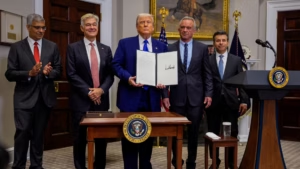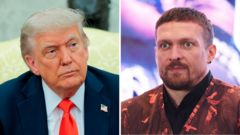President Trump's latest executive order aims to tackle the rising cost of prescription drugs by pressing pharmaceutical companies to cut prices voluntarily or face stricter price controls.
Trump Signs Executive Order to Lower Prescription Drug Prices for Americans

Trump Signs Executive Order to Lower Prescription Drug Prices for Americans
New initiative compels drug manufacturers to either reduce prices or align with international standards
In an unprecedented move, President Donald Trump has initiated a transformative push for prescription drug reform by signing an executive order mandating that pharmaceutical companies either agree to voluntarily reduce their prices or be required to match the lowest prices offered in other developed nations. The executive action is born out of a long-standing concern over the significant price disparities that American consumers face compared to their counterparts in Europe and Canada. This order imposes a 30-day deadline for companies to present substantial price reductions, failing which the administration will implement a strategy to tie American drug costs to international pricing.
The Trump administration is portraying this bold initiative as a necessary challenge against an industry perceived as monopolistic and lacking accountability. The rising costs of medications have become increasingly burdensome for Americans, particularly older citizens and those from low-income backgrounds, as these costs have escalated faster than wages. Trump's criticisms of the pharmaceutical sector as a powerful interest group have been consistent throughout his presidency, and this executive order exemplifies his commitment to tackling high drug prices.
Advocates of this policy assert that it is long overdue, and argue that it is both economically wise and ethically imperative. Given the pressing need to address the affordability crisis in healthcare, the decision to bypass legislative bottlenecks signals a strategic effort by the Trump administration to take decisive action on this critical issue.
However, there are apprehensions regarding the potential implications of this order on innovation within the pharmaceutical industry and its resilience against possible judicial challenges. White House representatives suggest that this order is merely an opening act in a broader series of reforms, which could entail further changes such as enhancing supply chain transparency and other accountability measures.
For millions of Americans who struggle to keep up with the prices of essential medications, this executive order could serve as a critical juncture in healthcare reform, while also representing a hallmark achievement for the Trump administration's campaign against excessive corporate practices.
The Trump administration is portraying this bold initiative as a necessary challenge against an industry perceived as monopolistic and lacking accountability. The rising costs of medications have become increasingly burdensome for Americans, particularly older citizens and those from low-income backgrounds, as these costs have escalated faster than wages. Trump's criticisms of the pharmaceutical sector as a powerful interest group have been consistent throughout his presidency, and this executive order exemplifies his commitment to tackling high drug prices.
Advocates of this policy assert that it is long overdue, and argue that it is both economically wise and ethically imperative. Given the pressing need to address the affordability crisis in healthcare, the decision to bypass legislative bottlenecks signals a strategic effort by the Trump administration to take decisive action on this critical issue.
However, there are apprehensions regarding the potential implications of this order on innovation within the pharmaceutical industry and its resilience against possible judicial challenges. White House representatives suggest that this order is merely an opening act in a broader series of reforms, which could entail further changes such as enhancing supply chain transparency and other accountability measures.
For millions of Americans who struggle to keep up with the prices of essential medications, this executive order could serve as a critical juncture in healthcare reform, while also representing a hallmark achievement for the Trump administration's campaign against excessive corporate practices.




















